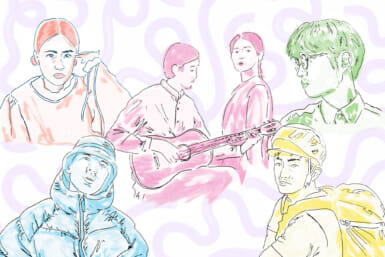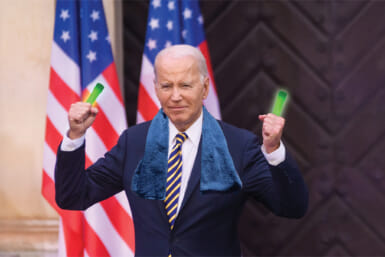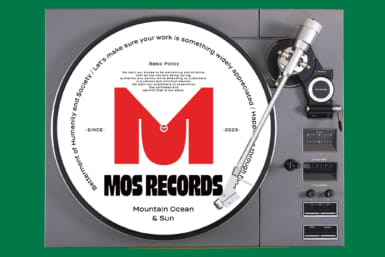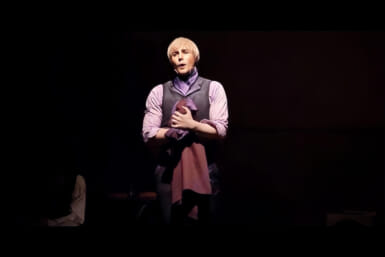When vending machine technician Chris Hart started uploading some of his songs on YouTube, he was just hoping for some feedback from people in Japan. What he didn’t anticipate was the impact that those videos would have, not only on his music career, but also his love life.
By Matthew Hernon
Yes, I met my wife via YouTube,” Hart tells Weekender. “She posted some videos on there singing in English, then saw mine and contacted me. We decided to meet up and make some music together; we hit it off right away and within two weeks were already talking about marriage. After that we were invited on to a show about chance encounters by NHK where we performed a SMAP song. Someone from Nippon Television saw it and invited me on Nodo-jiman Za! World.”
The popular seasonal reality show features foreigners singing in Japanese, and Hart won it in the spring of 2012. Covering Kazumasa Oda’s ballad “Tashika na koto” and SMAP’s “Yozora no mukou,” he wowed the judges with his pitch perfect, soulful voice. Masahiro Nakai, who witnessed Hart’s rendition of “Yozora,” a far more accomplished display than his own group had ever achieved, admitted that he felt “embarrassed to come on stage” after the San Francisco–born singer, and appeared genuinely nervous when he was asked to sing alongside him. Looking like a true professional, the majestic vocal display helped to propel Hart from a part-time club singer to a genuine J-Pop star.
“I went in to the show with no expectations,” he tells us. “It was only after being on it that I became aware of how popular it is; it really is watched by a lot of people. Consequently, this can have a big effect on the sales of the songs you perform. I actually returned the following fall season and sang “Home” by Yusaku Kiyama and the original version then got to number one in the charts, five years after it was first released.
Of course it has also helped to open doors for foreign singers such as myself, Nicholas Edwards and Diana Garnett. There is no recording contract for the winner like American Idol, but it helps to get you spotted. Fortunately for me Jeff Miyahara accidentally recorded the program when I was on it and apparently liked what he saw.”
One of country’s most sought-after record producers, Miyahara has collaborated with a number of high-profile Japanese stars as well as many international artists such as Boyz II Men and Timbaland. He quickly realized the huge marketing potential of Hart and arranged a meeting; soon after that the two men began working on the singer’s debut album.
They decided to start with a collection of covers—popular J-Pop hits that Hart grew up listening to from the late nineties onwards, including songs by the likes of Spitz, Masahara Fukuyama and Dreams Come True. A critical and commercial success, Heart Songs entered the Oricon charts at number three in June last year and has thus far sold more than 300,000 copies as well as winning numerous awards. For Hart, though, it is the reaction from fans that has given him the greatest satisfaction.
“I thought that people might find some of the tracks nostalgic, bringing back some memories of their youth or some kind of event in their past. What I didn’t expect, however, was the depth of emotion that the songs could inspire in certain individuals,” Hart says. “I had people writing letters to me about their families, hardships, dreams: all kinds of issues. There were even businessmen telling me about the stresses of their jobs; I was just amazed that these songs could have such a profound effect. It gave me clear ideas about what I wanted to do for my original music.”
Hart’s follow-up album, Song for You, gave him a chance to work on those ideas. Including popular tracks “I Love You” and “Yume ga samete,” which features iconic singer Seiko Matsuda, it was released earlier this year and further enhanced the 29-year-old’s reputation as one of the country’s most talented young musicians. Described by Hart as “an easy-listening J-Pop album,” it also showed he could write songs as well as sing them.
“I saw it as being like a natural progression from the debut album,” he says. “With the first one I was telling my history through the songs I listened to in my youth: with this one I was trying to tell other peoples history. It was my response to the letters I received, with the topics ranging from love to overcoming a lack of confidence.”
Hart has a strong bond with his fans, who regularly bombard him with gifts including CDs, jewelry and food. For some the emotion of seeing him on stage can be too much, and they spend the entire concert weeping. Many of his devotees say that he stands out because he “truly understands the soul of Japanese music.” There are many talented foreign artists in the country, but few are as dedicated as Hart. He started studying the language at the age of seven, began singing J-Pop songs in his early teens and since moving here five years ago, he has made a concerted effort to learn about all aspects of life in Japan.
“I actually first came here when I was 13,” he says. “It was just for a two-week homestay as part of the Japanese course I was taking at school, but I quickly fell in love with the place. The people were so hospitable, going out of their way to make sure I had a great impression of their country. I knew I had to come back; it just took a bit longer than I’d hoped. I did some jobs that required Japanese back home and then I finally got my chance to return with the vending machine company in 2009.
I wanted to start from zero, not coming with an American mindset. It was a huge challenge to engage in a culture that is so much more felt than spoken, but you have to make the effort. I saw people who moved to the States who didn’t adapt; they kept their traditions and did things their own way, which is fine up to a point, but it makes it more difficult to blend in and fully appreciate what is around you. When I arrived I wanted to learn as much about Japan as possible and I think that has helped to make my experience in this country that much better.”
Clearly loving life here, Hart plans on sticking around for as long as possible. He’s unsure how long he will remain in the public eye, but isn’t overly concerned about that. It has never been about being famous; he won’t be too disappointed if he slips off the celebrity radar in the near future. His goal is simple. He just wants to keep making music for those fans who have shown him so much support over the years. As long as they keep writing to him, he will keep trying to answer them with his music.









